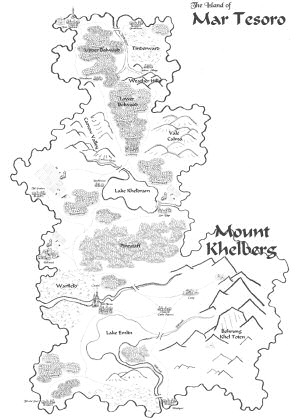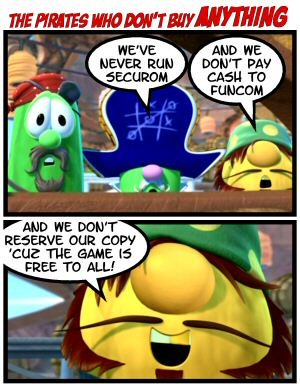I remember a long time ago – back when computers were made from clanking iron gears and most web browsers were steam-powered – in the run-up to the dot-com boom people were marveling at the idea that you could put ads on your website and make money when visitors to your site clicked on those ads using their crudely-made wooden mice.
At the time, people were scoffing at 10¢ click-through rates as a joke. Why, nobody can pay that much for a single visitor if they want to make money! I think it was true at the time, but things are much cheaper now. Bandwidth is cheaper. Getting some server space is cheaper. The software to run an online business is pretty much well-established and easily understood, so you don’t have to hire your own programmers to write custom software. Places like Google make setting up an ad campaign much simpler. Billing is more easily automated and shopping cart software is more or less free. (Every provider I’ve dealt with in the last few years has offered a shopping-cart solution in with their webhosting service, even with their $6/mo cheapo packages.) It really is a whole new game now. All of this is about six years too late – and in any case it wouldn’t have prevented the dot-com bust any more than opening an umbrella shop in New Orleans would have prevented hurricane Katrina – but it is nice to see these tools brought together, streamlined, and put into the hands of small businesses on the web.
Now, I’m not running an online business here, so these tools are of no direct use to me. What is of use is that they help companies who are trying to sell stuff online, which in turn has lowered their overhead, which has increased their advertising budget, which helped those of us who toss some ads onto our site. Not only is 10¢ per click-through perfectly reasonable, but now rates go even higher. (I average a little over 10¢ for text ads, but I assume Google is keeping a few cents for themselves.)
All of this confirms my belief that the dot-com boom wasn’t all vapors and dreams. There were real, honest-to-goodness opportunities out there, but they were buried under an avalanche of foolishness, buzzwords, and wishful thinking. Yes, your idea that you can make money by publishing interesting content and then living off of ad revenues was sound: The notion that you could support a staff of 100 people and make a billion dollars a year wasn’t. The dot-com boom was its own worst enemy. I think everyone would have been more successful if they had about a tenth of the money and a hundredth of their original ambitions.
(I have my own dot-com stories to tell someday. My company survived, although I didn’t like what happened to us during the boom and I really didn’t like what happened during the bust. Maybe I’ll put those stories up someday, although not just yet. I’m still at the same company and I don’t want to open old wounds. In fact, I think most of this post is an attempt to write about it without writing about it.)
But it is really encouraging to see some of those early promises paying off. The original dot-com model: Launch a corporate empire, then make a product, is absurd on its face. But now I see lots of smaller companies with similar – but more realistic – ideas surfacing. A lot of them show up as ads on this site. (Like Zwinkies, and a few others that I can’t think of and aren’t popping up as I write this.) And even those sites, by doing their thing, create a little bit of ad revenue for little hobby sites like mine. (Maybe mine is a bad example, as my bandwidth is leeched from mu.nu and if wasn’t for that I’d be losing money. Still, I think the point stands that some people can make money with hobby sites like this one.)
It turns out the dream was true, but only on a micro scale.
Project Button Masher

I teach myself music composition by imitating the style of various videogame soundtracks. How did it turn out? Listen for yourself.
Who Broke the In-Game Economy?

Why are RPG economies so bad? Why are shopkeepers so mercenary, why are the prices so crazy, and why do you always end up a gazillionaire by the end of the game? Can't we just have a sensible balanced economy?
D&D Campaign

WAY back in 2005, I wrote about a D&D campaign I was running. The campaign is still there, in the bottom-most strata of the archives.
The Truth About Piracy

What are publishers doing to fight piracy and why is it all wrong?
Control

A wild game filled with wild ideas that features fun puzzles and mind-blowing environments. It has a great atmosphere, and one REALLY annoying flaw with its gameplay.
 T w e n t y S i d e d
T w e n t y S i d e d
Launch a corporate empire, then make a product, is absurd on its face.
Damn, I’m doing this all backwards!
The dot-com bubble greatly underestimated the time it would take to build a viable web business, but it also greatly underestimated the potential of the internet. Which is good for me.
And given the cost structures for mee.nu, I’ll be pretty happy with revenues of 1/100th of a billion dollars a year. :)
Ah, but do you remember the time when for-profit use of the Internet was considered at best distasteful, and possibly illegal?
Eric: No. I got here in 1994, which was most likely after Eden had aleady been paved over.
I was on Usenet as early as ’85, and for me, the paving of Eden was one of the best things that ever happened.
Eden was paved in 1993, when AOL started “The September that Never Ended”. I got on after the Great Renaming of ’87, but before Endless September, because my job as Tech Support for a software company meant that someone had to figure out how to answer external support emails and throw up a web page so people could find our phone number. We had a shell account for the company at an ISP.
Those pre 1993 days were something else. Back then Macintosh users had to lay low to escape the scorn and flames from all the Unix users…
1985? Wow, I am actually impressed. I first heard of the Internet when the worm happened, and that was in.. what, 1987? I was on local bulletin boards then, but didn’t get online until 1990.
So, yeah, I was there when it became distasteful to use it for commercial purposes. This was, in part, because the early commercial ventures were so disgusting. The place was rife with MLMs and other scams. They relied on trashing the message boards and spamming to try to get their product out. And those idiots still haven’t gone away. We’ve just written more software to discourage that particular kind of commercial use.
In retrospect, it was completely ridiculous to think that the Internet would not have become commercialized. But then, even though I was online (purely for recreational purposes – I was never at a college that gave me legitimate access) at that point, I was completely ignorant. I never even saw the web coming. I thought telnet, ftp, and usenet were the BEST THINGS EVER!
I still tell people about The September That Never Ended. I try to explain what the place was like before the floods came.
I guess I think of it now as a completely artificial frontier. It’s fascinating to look at in retrospect. Even as an aspiring novelist, I want to see the Internet completely destroy the publishing industry as it currently exists. I want every magazine to cease paper existance. I want DRM to go away, fair use returned, and the death of all mediums that needlessly consume physical resources.
If it’s going to be commercial, let’s take it all the way.
Pixy sez:“I'll be pretty happy with revenues of 1/100th of a billion dollars a year.”
Just remember us MuNuVians when you get rich, Pixy!
Mmmm… I could line The Pond with gold…
I remember someone back then writing dates as “Tuesday, September 917th, 1993” or whatever. It was a huge change for what was at the time a relatively small community, but ultimately it was necessary, predictable, and very much for the better.
I was mostly using the BBS systems from the mid-80s to the early 90s and switched some of my usage to the wannabe Internet of the day (Prodigy). I remember the disdain everyone had when they found out Prodigy would start charging a fee for emails.
It wasn’t until the mid 90s when I continued online, but this time it was on the Internet (back when the rave was Mozilla, and IE was an inferior product…oh wait…). Remember all the pyramid schemes that went on in the day?
They expanded it to my city, and a lot of people got burned really bad because of it until the authorities caught on. The buy-in was $2000, and most people lost cash. Scratch that…most *gullible* people lost cash…
I never thought much about the whole “eternal september” thing. That was about the time I first got online. I was on usenet as early as about 92 on the Prodigy service and the only thing it was useful for (to me) was find cheat codes for computer games. I would have been about 11 at the time, though. When Prodigy died and I got onto AOL (before getting a real ISP) I remember all the usenet users bitching about how all the AOLers were “ruining everything”.
In retrospect I feel bad for them. AOL basically took over their service. I mean they still wanted to believe they were in control, but when the newbs are in the majority, it basically is their system. I don’t know if the creation of “moderated” usenet forums coincided with this time period, but I wouldn’t be surprised.
Does anyone still use usenet though? It’s so unbelievably clogged with spam now that I have a hard time seeing how it is useful to anyone. The only things I’m aware of that persist on usenet are erotica and a few binary file-sharing groups. It just seems to me that Usenet was pretty much obsolete about 10 years ago, having been replaced by web forums, file sharing networks and blogs.
I miss the good old days, before the blink and img tags, back when the internet was vast and beautiful and impossible for mere mortals to access. But then I realize that without the img tag I might not be able to read DM of the Rings and I am content with how things turned out. :)
Corwin, the 1995 internet version of DM of the Rings would be something like this:
DM Of the Rings XLVIII
Panel Four: Skip to Frame 5526 on Disc 5 of Two Towers laserdisc for visual.
Gimli: Tell me your name Horse-F—er
Aragorn: Gimli!
Part of the problem with early WWW (as opposed to internet) business models was their use of what they called a “Sears Roebuck” approach. This refered to the practice of Sears Roebuck tossing their catalogs into any wagon train heading west and relying on orders being generated as a result “sometime”. The orders would return with the mails (eventually) and the next wagon train would take the goods west unless by then a railhead had been established at the destination.
The key concept to grasp here is that the message carrying infrastructure was slow but it was free. Other people were paying for the pipeline to be built.
Many of the businesses I was acquainted with didn’t understand that free or dirt-cheap dial-up wasn’t available in the areas that would most benefit from a Sears Roebuck model – places where getting to a retail outlet was more trouble than mail order. The infrastructure simply wasn’t in place for the analogy to work. To reference their own model, the wagon trains weren’t going to the places they wanted to offer their goods or services to.
As an example, in Grande Prarie Alberta, where my parents live, until recently AOL was a long-distance call to connect to, at usurous rates. They still have no broadband service in parts of the town to this day, which makes patch tuesday an overnight experience sometimes.
Steve.